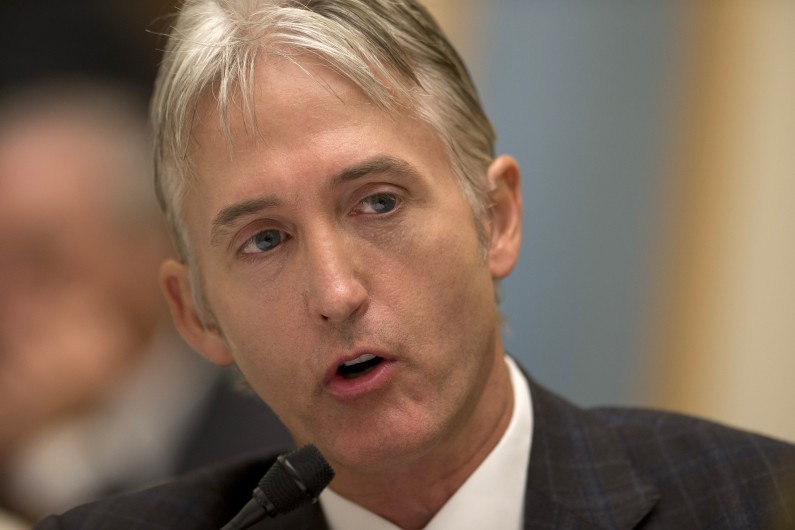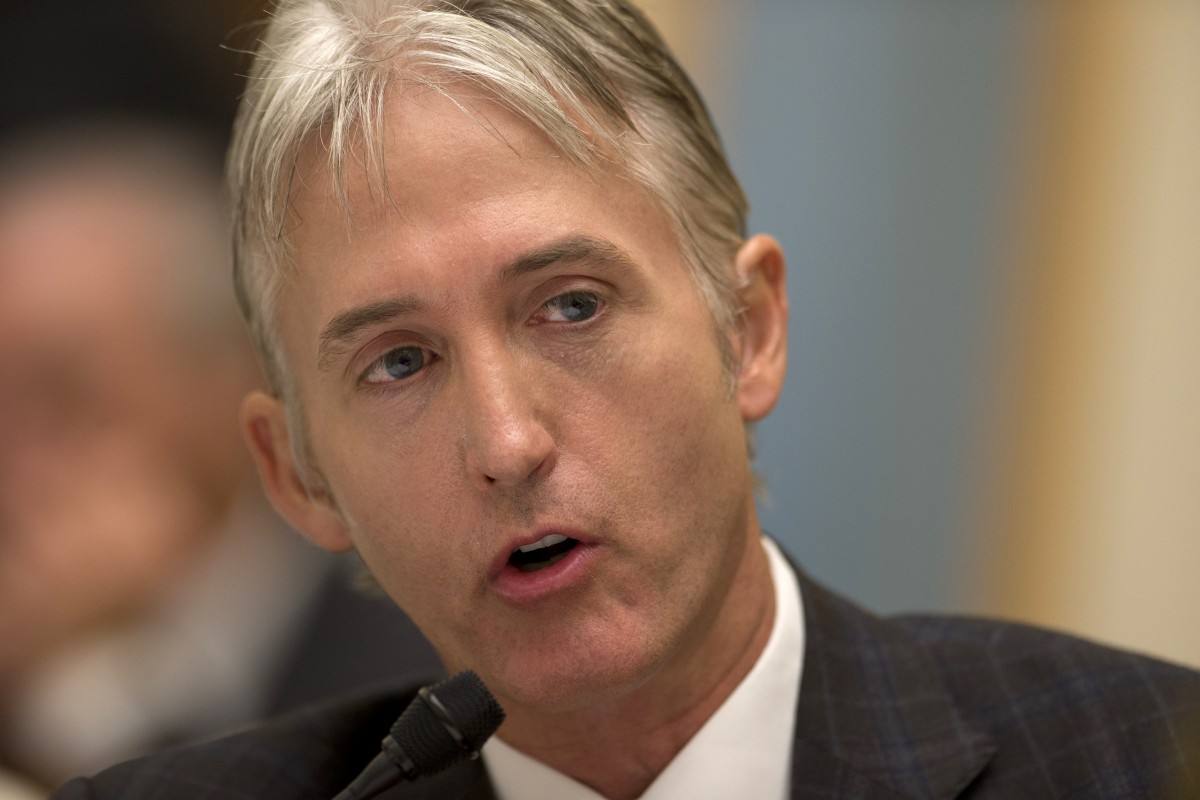
Despite the legalization of medical marijuana use in 20 states and Washington, D.C., as well as the legalization of recreational use in Colorado and Washington state, the federal government has yet to decriminalize or legalize marijuana for any reason, including medicinal use.
Federally-approved research for the drug continues to be limited in scope and granted overwhelmingly to those whose research proposes the drug is harmful and has no medicinal value. The Drug Enforcement Administration continues to raid dispensaries and arrest patients in states where the drug is legal, but that doesn’t appear to be enough for many conservatives.
The GOP-controlled House passed a piece of legislation last week that forces President Barack Obama to enforce federal marijuana laws across the United States, including in those parts of the country that have legalized the substance for one purpose or another. If Obama and his administration fail to “faithfully execute federal laws,” the House and Senate would be allowed to sue the president.
Known as the Executive Needs to Faithfully Observe and Respect Congressional Enactments of the Law, or ENFORCE the Law Act, introduced by Reps. Trey Gowdy (R-S.C.), Bob Goodlatte (R-Va.), Darrell Issa (R-Calif.) and Jim Gerlach (R-Penn.), the legislation passed in a 233-181 vote. Sixteen House members abstained from voting. While five Democrats voted in favor of the measure, not one Republican voted against it.
In a statement, Gowdy said he proposed the bill because “[t]he Constitution gives Congress the responsibility to write the laws and the Executive to enforce them. We don’t pass suggestions. We don’t pass ideas. We pass laws.”
“This administration’s disregard for the law has reached an unprecedented level from a constitutional perspective,” he continued. “From unilaterally changing the Affordable Care Act, to suspending parts of our immigration laws, to ignoring statutory mandatory minimum laws in narcotics cases, the President’s actions threaten to usurp our system of co-equal branches of government.”
Following passage of the bill, Senate Majority Leader Harry Reid (D-Nev.) released a statement assuring the American public that the bill would be “dead on arrival” in the Senate. Obama has also said he would veto the legislation, reasoning that it “violates the separation of powers.”
‘Executive overreach’
Though the legislation also criticizes the Obama administration’s “executive overreach” in other political realms, such as the Affordable Care Act’s birth control mandate and immigration, one of its most controversial facets was the section on the passage of marijuana legalization laws in almost half of the country.
In a committee report submitted by Goodlatte, the Republican Congressmen who sponsored the bill argued that because marijuana remains a prohibited substance under the Controlled Substances Act, all use and distribution of the drug — regardless of state laws — remains illegal. The Congressmen also pointed to a U.S. Supreme Court decision from 2005, which found that the act did not make any exceptions, not even for medical marijuana.
The report’s authors briefly, and somewhat inaccurately, summarized Attorney General Eric Holder’s announcement last fall that the Justice Department would not legally challenge Washington state and Colorado’s laws legalizing adult recreational use of marijuana, by saying the Obama administration simply opted not to enforce the Controlled Substances Act.
The reality is that the DOJ simply deferred its legal right to challenge the marijuana legalization laws in those two states for the time being. Since the DOJ said it had no plans to legalize marijuana, the government entity said federal prosecutors will continue to “aggressively enforce” marijuana’s status as a Schedule I drug in states that have not legalized it fully.
In other words, while Washington state and Colorado are allowed to implement state rules and regulations regarding the legalization of recreational marijuana, there was no mention of how the DOJ would respond to states that have legalized medical marijuana, such as whether residents could legally use marijuana for either recreational or medical purposes in those two states, and it wasn’t exactly clear what kind of warning states would be granted if the DOJ did decide to file a lawsuit.
Half-hearted support
Though the GOP’s latest effort to criticize Obama would come at the expense of the thousands of medical marijuana patients in states that have legalized the substance, Rep. Earl Blumenauer (D-Ore.) said that there are a lot of people on Capitol Hill who are attempting to craft a sensible federal marijuana policy.
However, some Republican lawmakers who have supported relaxing federal marijuana laws voted in favor of the ENFORCE the Law Act. These lawmakers include Rep. Mike Coffman of Colorado, who supported the legislation allowing marijuana businesses to have access to the banking industry, and Reps. Dana Rohrabacher (Calif.), Justin Amash (Mich.) and Don Young (Alaska), who supported the “Respect State Marijuana Laws Act” of 2013.
Though it seems hypocritical that Republicans would endorse a law that gave more power to the federal government and chips away at state’s rights, it illustrates the complexities of the war on drugs. Given that no major political party has added marijuana legalization to its platform, lawmakers’ support for legalization seems to come most often when their need for public support is at its greatest.
In Obama’s case, his push to halt enforcement of federal drug laws has not been as helpful as some had hoped. Dispensaries in states such as California, where medical marijuana use has been legalized, continue to be raided. As for Gowdy’s fears that Obama might somehow legalize marijuana on a federal level one day, he really has nothing to worry about.
Obama may have once used marijuana himself, but since the federal government classified the substance as a Schedule I drug, in the federal government’s eyes, it has no medicinal value. There have been attempts to reschedule marijuana to a lower classification — one that recognizes the drug’s medicinal benefits and its low rate of abuse — but the DEA has largely refused.
Despite the best attempts of legalization advocates, the Supreme Court declined to hear a case last fall on the DEA’s refusal to conduct a scientific review of marijuana’s safety and therapeutic efficacy, arguing that there was a lack of scientific evidence proving marijuana is a safe and viable medical option.
By opting to decline to hear the case, the Supreme Court essentially agreed with the D.C. Court of Appeals in its ruling that the DEA had the right to decide which drugs could be studied and determine the dangers associated with each drug. As marijuana legalization advocate Russ Belville stated in an article for High Times, each year the U.S. spends about $40 billion fighting the war on drugs, even though no one has ever died from consuming or smoking too much marijuana.
“The DEA requires we show real, FDA-approved research proving marijuana is medical, safe and non-addictive, and since the DEA won’t let that research happen, there is nothing forcing them to change the scheduling of cannabis,” Belville wrote.


